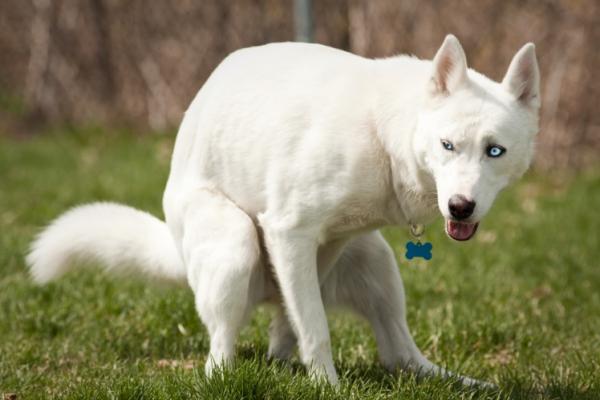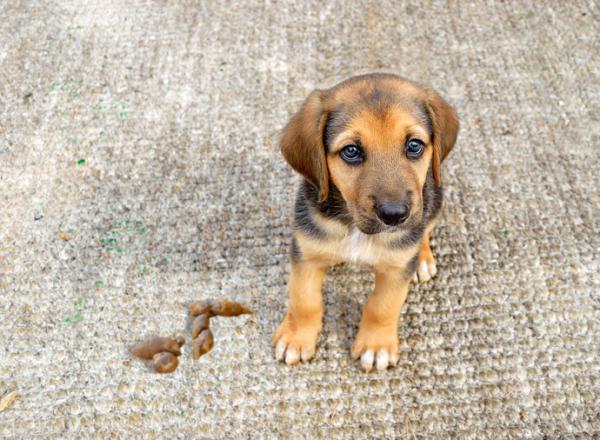My Dog Has Diarrhea But Acts Fine - What Do I Do?



See files for Dogs
Caring for our dogs requires a closeness which has many positives. We get to share their excitement, feel their love and eventually become like family. Unfortunately, our responsibility of care also requires us to look at their stool. It is not uncommon for a dog to get diarrhea at some point. While it may not cause serious harm, diarrhea can be discomfiting for the dog and be difficult for us to clean up. However, it can also be the sign of a serious illness. This is why it can be difficult to determine what is wrong if a dog had diarrhea, but acts fine.
AnimalWised looks into the different causes of diarrhea and shows how concurrent symptoms can point to what the problem may be. It is always advisable to take your dog to the veterinarian so a proper medical diagnosis can be performed.
What causes diarrhea in dogs?
While there are many causes, it is important to first determine the type of diarrhea in dogs. If your dog has an underlying disease which causes gastrointestinal issues, they are likely to have chronic diarrhea. Sudden diarrhea occurs when an acute problem arises. The latter is when a dog has some physiological problem which has diarrhea as a symptom. Diarrhea can be a symptom of psychological stress, as can constipation in dogs.
Causes of acute diarrhea
These instances are when diarrhea occurs all of a sudden. In mild cases, the diarrhea will soon pass in a couple of days and the stool will once again become firm. However, when it is the symptom of serious illness, then other symptoms will develop.
- Infection: there are various types of bacteria, viruses or fungi which can lead to gastrointestinal issues in dogs. The bacteria affects the cells in the digestive tract and causes malabsorption, the result being watery stool. Bacterial infections, viral infections and fungal infections in dogs include leptospirosis, parvovirus, staph infection and blastomycosis.
- Parasitical infestation: sometimes the parasite is a vector for bacteria, but the parasite itself can cause something known as parasitosis. This can lead to diarrhea. It is important to inspect the dog's stool for the presence of mucus, eggs or living parasites.
- Allergies: while many dogs will have a robust dietary constitution, it is important to know that dogs can have food allergies just like humans. The majority of dogs will have an intolerance to lactose, the enzyme found in dairy products. While it is unlikely to kill them, dairy products are likely to cause acute diarrhea, even if they otherwise appear fine. Some dogs may have intolerances or allergies to other products.
- Poisoning: a dog's appetite will lead them to eating things they shouldn't. If they have mild poisoning, then diarrhea is usually a symptom. Poison can take many forms, but it is important to remember there are some foods toxic to dogs which they need to avoid. In acute intoxication, the dog will not be fine and can even enter toxic shock.
- Medications: some drugs might have diarrhea as a side effect, but this will cease when the course of the prescription is over. Human medications should not be given to dogs as they can be poisonous.
- Obstruction: if a dog has eaten a foreign object, it is not uncommon for something to be lodged in their gastrointestinal tract. This also causes malabsorption and leads to diarrhea. Some obstructions may simply need time to pass, but others can cause serious and life threatening conditions such as gastric torsion.

Causes of chronic diarrhea
As we stated above, chronic diarrhea occurs with more regularity and is the symptom of a chronic disease or medical condition. These conditions might not be serious at the beginning, but they can be doing serious internal harm. This is why, if your dog has diarrhea regularly, but otherwise seems normal, you should still take them to the vet for a checkup.
- Kidney disease: the kidneys are an essential part of a dog's metabolism. If they suffer from renal failure, then diarrhea might be a symptom. If left untreated, their body can shut down. Kidney disease may be the result of an initial acute problem such as leishmaniasis which results in poor kidney function.
- Liver disease: similar to kidney problems, when a liver fails it can result in diarrhea. This may be cause by various diseases such as cancer.
- Stomach or intestinal ulcers: if ulcers are present in the digestive tract, it will affect their function and can cause diarrhea in dogs. This might be accompanied by inflammation of the intestines.
- Colitis: a general term for inflammation of the colon is colitis which can result in loosening of the stool.
- Hormonal imbalance: if a dog suffers from problems with certain glands, they may not be able to produce enough hormones to control their bodily functions. Underactive adrenal glands can cause diarrhea due to this hormonal imbalance.
- Irritable bowel syndrome (IBS): our understanding of irritable bowel syndrome is relatively limited, but we do know that it is caused by irritation of the lining of the intestines. Dietary intolerance, lack of fiber and even mental stress are believed to be causes. Colon inflammation and diarrhea caused by IBS in dogs is often accompanied by vomiting and there may be mucus in their stool.
- Stress: stress in general can cause a dog to have nervous bowels. The cause of the stress could be due to abuse, lack of education or even a trip to the vet[1], but all may result in loose stool. Minimizing stress is vital for their overall health and can reduce incidents of diarrhea significantly.
Some chronic illnesses which cause diarrhea are asymptomatic, meaning they don't initially show symptoms. When diarrhea occurs it means the problem is advancing and it may become serious. Sometimes you may see that your dog has intermittent problems. Maybe a dog has diarrhea for 3 days, before returning to normal, then has it for another three days in repetition. If this occurs, then there may be a chronic problem which has flare ups. Diagnosing this condition may be vital in ensuring their health later in life.
If my dog has diarrhea, but is acting normal, is there a problem?
When a dog has diarrhea, but is otherwise acting fine, you may ask yourself if you need to do anything about it. One of the things that most stops us from taking them to the vet is our love for the dog. We don't want them to be unwell and taking them to the veterinarian can seem like we manifest the problem. However, it is always better to go to the vet and there to be no problem than not taking them and worsening their prognosis.
If your dog seems otherwise fine, there is still the chance the diarrhea is the symptom of an underlying chronic illness. Your vet may carry out certain diagnostic tests to determine what this condition may be.
Still, it is understandable that even the most caring of dog caretaker might not want to go to the vet straight away if their dog suddenly has diarrhea, but behaves normally otherwise. Vet's bills are expensive and we may not want to put the dog through the trauma of a vet visit unnecessarily. This is why there are some specific things to look out for if our dog has diarrhea.

How long has the dog had diarrhea?
Generally a dog should defecate as many times per day as they feed. Their stool should be solid, but soft and some variation of brown. Black, yellow and red stools are a sign something is wrong, although what the dog has eaten will play some part. If your dog has two loose stools continuously, then you should start to be concerned.
If the diarrhea does not stop after 24 hours, you should consider taking your dog to the vet. It is very important to look at any other symptoms they may exhibit. If the problem is a bacterial or viral infection, then symptoms can worsen rapidly. This is especially the case with infections such as parvovirus. In these cases the dog will not be otherwise fine. You will see that the dog becomes lethargic, loses all appetite and they will likely vomit also. Immediate veterinary medical attention is necessary.
Dog diarrhea appearance
When a dog has diarrhea, it is important to look not only at the consistency of the stool. A dog's loose stool might also have other aspects you need to investigate. The color is important as yellow and green stool implies there is a medical problem. However, you need to be careful you don't confuse watery diarrhea with mucus. If there is mucus in the watery diarrhea it could be due to:
- Parasites
- Irritable bowel syndrome
- Cancer
- Gastroenteritis
Another problem might if you see blood in the stool. If the blood is fresh, it will be a bright red color and is known as hematochezia. If the blood has been in the system, it will be dark brown or black and is known as melena. Bloody diarrhea can occur even if the dog seems fine and behaves normally. The problem could be due:
- Viral infection
- Hemorrhagic gastroenteritis
- Rectal wounds
- Stress
- Drug side effects
- Tumors
- Poisoning
- Bacterial infection
- Fissures
In these cases, the dog may be fine at the beginning, but the problem will likely require treatment. We have information on the subject if you want to know more about what to do if you see blood in your dog's feces.
Other symptoms
If you see your dog has diarrhea, but they appear fine, there may be other things you don't notice. Maybe you see your dog isn't eating but is acting normal when they have diarrhea. If a dog loses their appetite, then it is an almost certain sign there is a problem. Whether it is a physiological or a mental issues, the quicker it is addressed, the better the prognosis.
Dogs are often found vomiting when they have diarrhea. Vomiting implies there is something wrong, but it doesn't necessarily have to be a worse case scenario. If the dog vomits as a once off and then has some diarrhea, it is likely they simply ate something which disagreed with them. The problem is if the dog continues throwing up when they have diarrhea. This could be the sign of a serious illness and they will need to go to the vet immediately.
Another important aspect is to consider the dog's state of well-being. Older and younger dogs are more vulnerable and therefore might be in greater danger if they have diarrhea. If a puppy has diarrhea, then they are particularly vulnerable. However, it is important not to confuse puppy diarrhea with normal loose stools of a weaned puppy. If they have consistent diarrhea, then this may be a cause for concern, but look to other symptoms.
According to a 2015 report, both age and breed have a “significant effect on the distribution of digestive problems in dogs”[2], so it is important to be careful with senior dogs as well as puppies. You can have a look at our breed files for information on specific health problems of your dog breed.

What is the treatment for diarrhea in dogs?
As we have explained, the causes of diarrhea in dogs are myriad. The veterinarian will carry out diagnostic tests and determine the cause and treat this. If it is a parasitical infestation, then a deworming process will need to be carried out. If the cause is chronic, then they may need to change some elements of your dog's lifestyle such as diet and exercise.
One of the reasons why a dog has diarrhea, but seems otherwise fine, is due to an imbalance in gut flora. The bacteria in the intestines exists in a delicate balance which is why it can be upset when a dog ingests something they shouldn't have. One treatment which may improve the health of a dog with chronic diarrhea is fiber supplementation. Little is currently known, but some studies suggest[3] it is something worth investigating in the future.

This article is purely informative. AnimalWised does not have the authority to prescribe any veterinary treatment or create a diagnosis. We invite you to take your pet to the veterinarian if they are suffering from any condition or pain.
If you want to read similar articles to My Dog Has Diarrhea But Acts Fine - What Do I Do?, we recommend you visit our Intestinal problems category.









